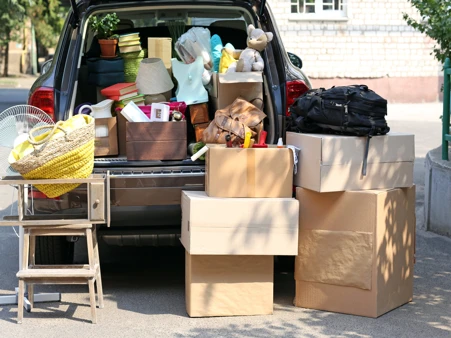Once you’ve had your offer accepted and the solicitors have begun their checks, now is the time to start sorting through your belongings and getting organised, ready for the move.
Get organised
Organisation is key when it comes to moving house. For some people, this will come naturally, but others may need a helping hand to make sure the move goes ahead as smoothly as possible.
Whether spreadsheets, colour-coded labels or lists is your thing, find something that works for you. This should help keep you on track and avoid you falling victim to the chaos that can often come when moving house.
It’s also worth decluttering your house before you start packing, so that you aren’t packing things that you’ll never actually need. This could also help save you money if you’re paying for a removals service.
Phone line/broadband
With the internet holding such an importance in our everyday lives, moving into a house with no internet is not ideal - especially if you have kids! - so it’s worth putting this on your to do list sooner rather than later.
If the house you’re moving to already has a phone line and broadband connected, then you’re not in such a bad position as you can get in touch with your provider about a week before the move to inform them. This way, they can make sure everything is ready for you ahead of moving day.
If your new house doesn’t already have a landline and broadband, then unfortunately you’re going to have to book an appointment and arrange for an engineer to come out and install one for you.
Change address
It’s important to start changing your address a few weeks before you move.
The Post Office offer a mail redirection service so you won’t have to worry about any of your post getting stuck at your old address. However, it’s still worthwhile getting in touch with any major companies yourself, such as your bank or building society, and your utility provider to inform them of your change of address
Meter readings
This can easily get overlooked, but it’s also an important one that you’ll definitely need to do. Make sure you make a note, or take a photo on your phone, of the meter readings when you leave your current property. Do the same when you move into your new home too, as the utility provider will need this information in order for you to pay your final bill and set up your new account.
Hire professionals or DIY?
Regardless of how many people are moving, or how many belongings you have, moving house is never easy. It’s very much a case of all hands on deck, so call on as many friends and family as you can to help with the move, and even better if they have a van or a large car they can bring along.
If you don’t have friends and family nearby, or perhaps you’d rather get everything moved quickly and efficiently, then you might want to consider hiring a professional removals company. If you’re moving during the summer months, bear in mind this is a busy time for removals companies, so it’s worth getting someone booked in advance.
Packing Tips
If you’ve got the contents of a whole house to pack up and move then you want to try and pack as efficiently as possible.
- Materials - you’ll need a variety of packing materials, including bubble wrap, strong boxes, sticky tape, brown tape and paper (try to avoid newspaper as this can leave ink prints on your belongings).
- Distribute weight evenly - include a mixture of heavy items (at the bottom of the box) and lighter items at the top. This way, you won’t cause yourself, or the removals team, a back injury by trying to lift heavy items!
- Coloured labels - colour code the house by room, e.g. living room is blue, kitchen is red, bedroom 1 is yellow etc. and put the relevant sticker on the box with the relevant contents in it.
- Label up fragiles - if you’ve packed all your finest glassware together, make sure you label the box as either ‘fragile’ or ‘glass’ so that everyone knows to handle these with care.
If you’re still waiting to sell your current property, you might want to read 'Top tips for selling your house'. Similarly, if you’re thinking about moving house, please feel free to get in touch with us today to review your financial position and see how much you might be able to borrow.
Important information
Your home may be repossessed if you do not keep up repayments on your mortgage.
There may be a fee for mortgage advice. The actual amount you pay will depend on your circumstances. The fee is up to 1% but a typical fee is 0.3% of the amount borrowed.

